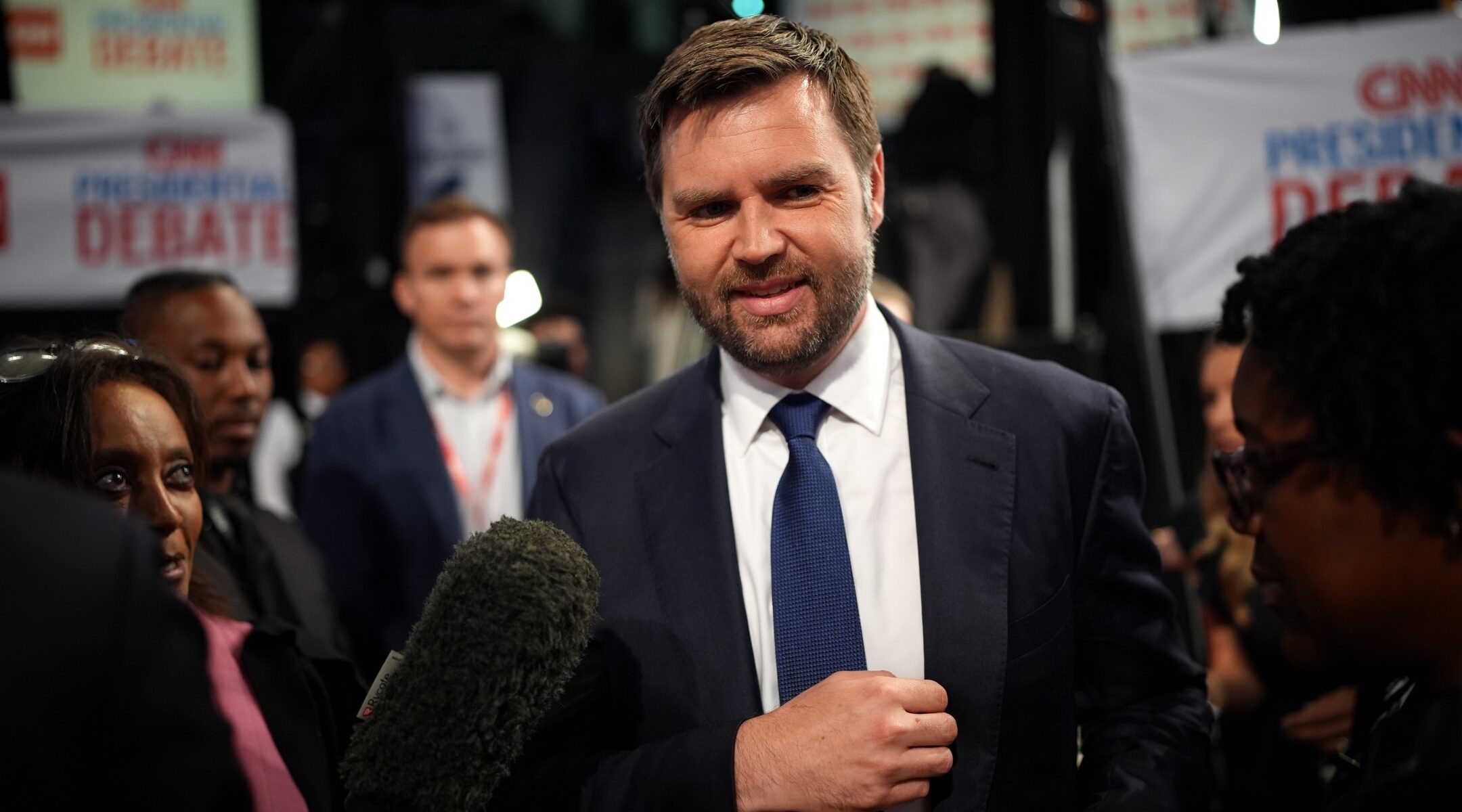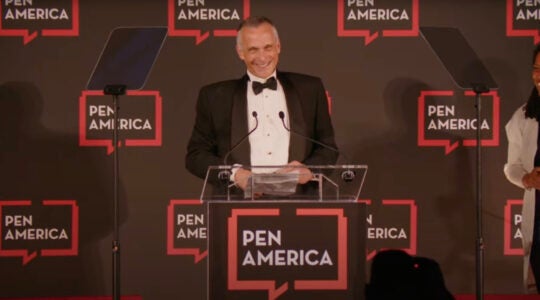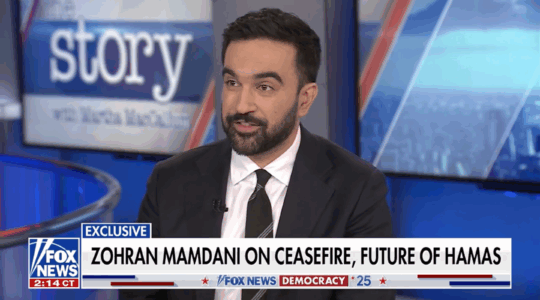MILWAUKEE — Donald Trump named as his running mate Ohio Sen. J.D. Vance, who once worried that Trump could become an American “Hitler” but who this weekend blamed Democratic rhetoric for Sunday’s assassination attempt on the former president.
The selection sets up Vance as an attack dog against those who are concerned that elements of Trump’s agenda and rhetoric echo hyper nationalist and authoritarian trends — a common concern among many Jewish liberals and Democrats.
Vance himself shared his own misgivings about Trump in a private message to a friend in 2016, writing that he was unsure about what to think about the then-candidate. “I go back and forth between thinking Trump is a cynical asshole like Nixon who wouldn’t be that bad (and might even prove useful) or that he’s America’s Hitler,” Vance wrote.
A spokesperson said the comment no longer reflected Vance’s views in 2022, when it was first reported during his Senate run. And in meetings with the Ohio Jewish community since his first campaign, Vance has said he prefers to battle extremists among Republicans privately.
Trump made his announcement on Monday, the first day of the Republican convention here, and cited Vance’s resume as a bestselling author of the autobiographical “Hillbilly Elegy,” a graduate of Yale Law School and a veteran of the Marines and a businessman.
Trump especially focused on what he sees as Vance’s Midwestern credibility in an election that will be closely fought in swing states. Vance “will be strongly focused on the people he fought so brilliantly for, the American workers and farmers in Pennsylvania, Michigan, Wisconsin, Ohio, Minnesota and far beyond,” Trump wrote in his announcement.
In an election in which the presidential candidates’ age has been a leading concern, Vance is notable for being 39 — exactly half Trump’s age. His 40th birthday is next month.
All together, that calculus appears to have shoved aside other close contenders for the role, including a pair with deeper ties to the Republican Jewish and pro-Israel communities, Sens. Tim Scott of South Carolina and Marco Rubio of Florida. Vance, his political career barely two years old, does not have much of a record on Israel — though he spoke two years ago at a convening of conservatives in Tel Aviv.
Vance has emphasized the threat that Iran, Israel’s enemy, poses to U.S. allies in the Middle East, and days after the Oct. 7 Hamas attack on Israel, which inaugurated the current war in Gaza, he joined the entire Ohio delegation in a letter to Ohio Jewish Communities, a community relations group, condemning the attacks and antisemitism. The senator has criticized President Joe Biden for his efforts to influence Israeli policy, including on judicial reform and its war strategy in Gaza.
Vance was one of 15 senators to vote against sending Israel emergency defense aid in April and two years ago, though his opposition was focused on a much larger part of the proposed legislation: funding for Ukraine.
At a speech at the Quincy Institute in May, Vance sought to distinguish between U.S. funding for Ukraine and support for Israel.
“It’s sort of weird that this town assumes that Israel and Ukraine are exactly the same. They’re not, of course, and I think it’s important to analyze them in separate buckets,” the senator said.
He added: “A big part of the reason why Americans care about Israel is because we are still the largest Christian-majority country in the world, which means that a majority of citizens of this country think that their Savior — and I count myself a Christian — was born and died and resurrected in that narrow little strip of territory on the Mediterranean. The idea that there is ever going to be an American foreign policy that doesn’t care a lot about that slice of the world is preposterous.”
Vance appeared to be gaining steam last week, when Trump indicated that his son, Donald Trump Jr., who is close to Vance, would be giving a speech just prior to the formal nomination of the vice president on Wednesday this week. Trump Jr. persuaded his father to back Vance in the 2022 Republican primary, a nod that boosted Vance over Ohio’s former Jewish state treasurer, Josh Mandel.
But doubts were cast this week on the nomination when Trump emerged from the assassination attempt in Pennsylvania with a pledge to cast aside what he had indicated would be a typically fiery speech for one that would preach unity.
Within an hour of the attempt — which grazed Trump’s ear, killed a supporter and gravely wounded two others — Vance was blaming Democratic rhetoric for the attack. The motive of the 20-year-old gunman, who was slain at the scene, is not known.
“The central premise of the Biden campaign is that President Donald Trump is an authoritarian fascist who must be stopped at all costs,” Vance said on X. “That rhetoric led directly to President Trump’s attempted assassination.”
Jewish Democrats have made similar warnings about Trump a central plank of their attacks on the candidate, this year and in the 2016 and 2020 elections. Halie Soifer, the CEO of the Jewish Democratic Council of America, in a Haaretz op-ed recently said “Biden vs. Trump Is a Simple Choice for American Jews: Democracy or Dictatorship.”
The Republican Jewish Coalition welcomed Vance’s selection, saying that he “will always stand with the Jewish community and with America’s key strategic ally Israel.”
Several left-wing Jewish Democratic groups meanwhile criticized Trump’s pick.
“J.D. Vance is a far-right extremist who denied the 2020 election results, supports a national abortion ban and voted against aid to Israel during its war with Hamas,” said Mark Mellman, president and CEO of Democratic Majority for Israel, in a statement. “As vice president, he’ll advance a MAGA agenda, whose north star is sowing division and hatred.”
J Street, the liberal pro-Israel lobby, said Vance would embolden the right-wing Israelis to whom he spoke in Tel Aviv. “The Israeli far-right and settlement movement now has an enthusiastic cheerleader on the Republican ticket,” president Jeremy Ben-Ami said in a statement. “It will be a disaster for Israel’s democratic future if he ends up in the White House.”
Liberal groups also have expressed concerns about elements of Trump’s current platform, particularly a pledge to deport millions of undocumented immigrants, and throughout the years have called him out for flirting with the far right. Trump also refused to accept the results of the 2020 election and has not said he will accept the results in 2024 should he lose.
Vance also has stoked concerns among traditional Republicans who favor a robust foreign policy. He has emerged as a frontline critic of defense assistance to Ukraine to repel its Russian invaders. He and others who opposed the assistance delayed for months an aid bill that included emergency funding for Israel.
Howie Beigelman, the CEO of Ohio Jewish Communities, which lobbies state officials, has said that Vance is a respectful interlocutor who listens to those who differ with him. “He’s always met with Ohio’s Jewish community, always taken meetings with pro-Israel advocates & given us probably the most unvarnished legislative truths,” Beigelman tweeted earlier this month.
Vance came under fire from his 2022 rival, former Democratic Rep. Tim Ryan, for accepting an endorsement from Georgia Rep. Marjorie Taylor Greene, a champion of the far right. She has repeatedly offended Jewish sensibilities by trivializing the Holocaust and peddling antisemitic conspiracy theories.
Beigelman at the time told Jewish Insider that Vance, in a meeting with Jewish community leaders, said that his way of confronting bigotry was “doing it in the way most likely to affect change, which isn’t always a public reprimand.”
JTA has documented Jewish history in real-time for over a century. Keep our journalism strong by joining us in supporting independent, award-winning reporting.






